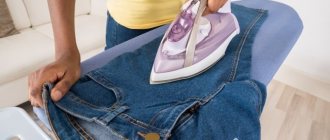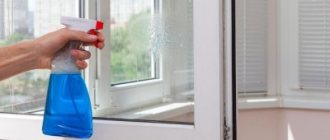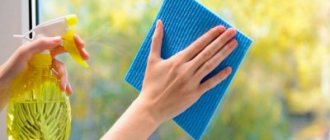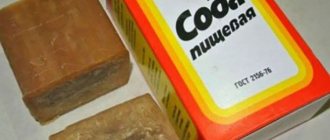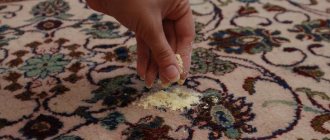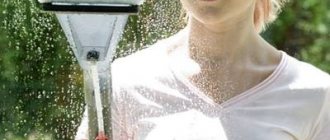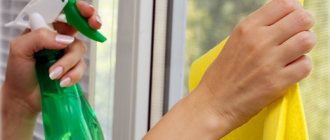Window cleaning includes cleaning the glass and removing streaks.
At the same time, it is important to achieve complete transparency, and this requires not only removing dust, but also dealing with drips and dried stains.
Simple home remedies based on vinegar will help to carry out high-quality cleaning. This publication will tell you more about how to clean windows with vinegar.
How to wash windows with special products
Modern sprays, foams, and impregnated wipes help to quickly and streak-free clean windows from dust, raindrops, and fingerprints, restore shine, and create a protective film.
Choosing household chemicals
When choosing a glass cleaner, pay attention to the composition of the product. A spray containing ammonia is best for removing stains and stains.
The most popular and accessible are:
- Mr. Muscle - quickly removes even stubborn stains and dissolves dirt. It has a pleasant, unobtrusive smell that quickly disappears. The spray can be used to whiten plastic window sills and slopes. Disadvantage: too much expense. A bottle of 500 ml can be bought for 200–250 rubles.
- Frosch - copes well with greasy marks, removes dirt, dust, stains. Suitable for plastic surfaces, you can wash slopes, window sills, and frames themselves. Price per package, volume 750 ml, 200–220 rubles.
- Help – suitable for frequent, regular cleaning. It removes standard dirt (dust, greasy fingerprints) well and leaves no streaks or cloudy residue. But it may not cope with heavy pollution on the street side. Disadvantages: it has a pungent, poorly weathered “chemical” smell, it takes a long time to evaporate from the surface. Price from 50 to 80 rubles.
- Synergetic is a liquid for cleaning glass, mirrors, and any shiny surfaces. Made from plant ingredients and labeled “Eco”. Declared by the manufacturer as a hypoallergenic, biodegradable product. Helps quickly wash windows, remove stains, and restore shine. It has an antibacterial effect, a pleasant smell, forms a protective film on glass, and complies with SAN-PIN standards. A package with a volume of 500 ml can be purchased for 150–170 rubles.
- Clin Windows & Glass is one of the most economical and affordable products. It produces a dense foam that effectively removes grease and deposits from glass without leaving streaks. Price for 500 ml of product is 180–200 rubles.
How to wash properly to avoid streaks
The quality of cleaning depends on how well you can remove dirt and dust, as well as dry and polish the surface.
Cleaning windows correctly, even with special products, requires several stages:
Remove everything unnecessary, prepare cleaning compounds and tools. Wash heavily soiled glass with warm water and soap. Clean the space between the frames and the frames themselves. Treat the fittings. Change the water and wash again. To remove excess moisture, use a rubberized scraper or faux suede cloth. Spray the prepared glass cleaner onto the windows. Using a scraper, drive excess moisture down the glass using a Z-shaped motion.
Wipe the windows well with a soft cloth, paying attention to the corners and joints between the frame and the glass. Wipe the frames, slopes, and window sill dry. Rinse your handles
For a shine, buff the surface with newsprint or a microfiber cloth. If there is no special anti-fog agent, treat the windows with an alcohol solution of glycerin (1 tbsp per glass of vodka or 0.5 tbsp of ammonia diluted with water 1:1)
Store-bought compounds may not cope with heavily soiled windows without first treating the glass on both sides with water and regular soap. Street dirt is difficult to wash off and leaves streaks.
Rules for washing frame frames
Plastic frames must not be washed with acetone, solvents or abrasives.
The different materials from which frames are made require an appropriate selection of cleaning products. They are not afraid of stains, but there is a danger of damage to the frame itself or its coating.
- For unpainted metal structures, any cleaning liquids and gels are applicable.
- It is unacceptable to clean plastic windows using aggressive substances and solvents - gasoline, alcohol, acetone and acids. They corrode the surface of the plastic, which leads to its yellowing. It is not recommended to clean such frames with powders containing abrasive elements that can scratch the coating.
- Painted wooden frames are cleaned with ordinary soapy water. After removing the main contaminants, it is recommended to additionally wash them with warm brewed strong tea.
To remove buildup from frame grooves and joints, you need to prepare a paste-like mixture of baking soda and hydrogen peroxide. Then place it on the contaminated area and after a few minutes remove it along with the dirt. This is difficult to do with rags and sponges, so it is convenient to use cotton swabs for cleaning.
If mold appears on the tree, you can remove it and prevent further spread with a strong solution of soda: 150–200 g per liter of water.
Features of window cleaning
It is better to use a separate rag for cleaning windows.
To carry out the procedure correctly and with maximum efficiency, you must follow these rules:
- Remove everything unnecessary from the windows.
- Do not use soda to wash frames, as it will destroy the structure and corrode the paint.
- Do not carry out the procedure if the weather is windy or hot, otherwise stains cannot be avoided.
- To prevent condensation from accumulating, wipe the glass with glycerin and alcohol, and also ventilate the room.
- In winter, use a saline solution to wipe glass. It will provide shine to the glass.
- You need to start washing from the inside, then the outside.
- Finally, wipe the glass vertically, then horizontally. This will prevent streaks from occurring.
- You should start washing from the top so that the dirt flows down.
- If there are small cracks in the glass, cover them with clear varnish. It will prevent the cracks from spreading further.
Cleaning is carried out as follows:
- First the frames are washed. Do not use powdered products, which may leave scratches on the surface. If the glass unit is coated with energy-saving coating, then aggressive solutions cannot be used, as they will wash it out. It is better to give preference to gentle drugs. A soap solution with dish gel is good for washing the frame. It is applied to the surface with a sponge and washed off with warm water. Wooden frames are washed with tea leaves.
- After this, they begin to remove contaminants from the glass using the prepared solution or purchased product.
- At the end, they remove soap stains. First, the glass is washed with cool water. After this, wipe with a paper towel or microfiber cloth.
For the procedure, you can use different means. Not only chemical ones are effective, but also recipes used from time immemorial.
Preparation for washing and procedure
After poor cleaning of windows, stains remain on them
Weather conditions during operation affect the transparency of washed glass. Stains on their surface form when the detergent dries quickly. Therefore, it is not recommended to start washing in hot weather, and especially when the sun's rays are shining on the glass. A cloudy and humid day is the best time.
Necessary materials
To wash windows without streaks with your own hands, in addition to the cleaning agent, you will need tools for applying and rubbing it. The following may be useful at different stages of work:
- sponges for basic washing;
- windshield wiper scraper with rubber nozzle;
- a brush with a long handle for external cleaning of non-opening windows;
- cotton swabs for cleaning joints and grooves;
- soft cloth to dry the surface;
- paper towels or newspaper for final polishing.
Since the degree of contamination of the glass outside and inside is very different, it is better to prepare two different sets of materials.
Sequencing
Windows must be washed following a specific method. The whole process takes place in several stages:
- Removing major dirt. At this stage, there is no need to carefully select the cleaning material and worry about removing stains.
- Complete frame wash. The following order is required: first the frames, then the glass.
- Preliminary cleaning of the surface with the selected product. Drying residual liquid and removing major drips.
- Polishing glass with soft cloths or paper to completely remove stains.
- Washing the window sill.
You can use the same cleaning agent at all stages. But it is better to remove dirt with one solution, and to add shine, use a special substance that does not leave streaks.
Useful tips
And finally, I want to share with you some effective tricks that will further simplify the process of cleaning glass.
- It is better to choose a cloudy day for washing windows. No, you definitely shouldn’t do this when it’s raining, but a few clouds in the sky would be nice. Under the scorching rays of the sun, the product dries quickly, which is fraught with stains, but in cloudy weather you will have more time for quality cleaning.
- Before washing your windows with vinegar, run a vacuum cleaner along the edges of the frames, picking up dust and dirt from them. Agree, this method is much more effective than smearing with a rag.
- Note to motorists! Don’t forget that the product described is good not only for washing windows, but also for cleaning car windows and making them shine.
- Don't forget to use rubber gloves while cleaning. They will protect the skin of your hands from irritation and redness.
Don't forget to protect your hands while cleaning
https://youtube.com/watch?v=3MqiFId_o4A
Features of using glass cleaner
Table vinegar is a food product based on acetic acid.
This substance allows you to completely eliminate stains and carry out high-quality polishing of a smooth glass surface. The effect of this use is based on the chemical properties of acetic acid. It is able to cope with various contaminants, acting as a solvent.
Using a vinegar solution is one of the most popular and inexpensive methods for cleaning windows, regardless of their size. The solution can be used on both external and internal surfaces.
General information
The chemical industry produces various professional products for cleaning windows and other glass surfaces in the form of sprays, liquids, and pastes.
German, Russian, Korean manufacturers present their products to consumers in a huge variety. The substances included in their composition easily cope with grease, stains, deal with germs, and have pleasant odors. But no matter what natural ingredients the manufacturers use, all these products are chemicals. When women did not have such assistants, they also did an excellent job with the windows, washing them until they shined. They knew many secrets about what to wash and how to apply the products so that there would be no unsightly streaks left on the glass. Women made window cleaning products themselves from improvised substances that they always had at home. They were produced quickly, were harmless to health and did not require financial costs.
Vinegar
Vinegar is the most commonly used element for preparing homemade products for cleaning not only glass, but also floors, kitchen appliances, tiles, glossy stretch ceilings, etc. The product does an excellent job of removing old fatty deposits. Therefore, removing dirt from glass is not a difficult job for him.
The easiest way to use vinegar is to dilute it in warm water. You need to take 50 ml per glass. For convenience, you can use a spray bottle. All you need to do is spray the solution over the entire window area and wipe with a clean rag or napkin.
Haven’t yet chosen a method for yourself and haven’t decided how to wash windows without streaks at home with vinegar? Here's another effective method. Just to do this you will need to take a few more ingredients:
- 1 tbsp. l. ammonia;
- 50 ml vinegar;
- a few drops of dishwashing detergent;
- a glass of warm water.
All these ingredients are mixed. The solution is poured into a spray bottle. The entire window area is generously sprayed, including the window sill, frames, and handles. Now you can go over them with a clean cloth. The product perfectly fights against any kind of pollution.
Interesting! How to remove grease from kitchen furniture at home
Benefits of homemade cleaning mixtures
By making your own detergent, you can be sure of its absolute safety, since you know exactly all the components. While modern household chemicals are simply replete with various additives, have a very strong chemical smell and are unsafe for children.
An undoubted advantage of the home remedy is its low cost. This way you can save significantly on the purchase of household chemicals, since the prices for them in stores are very high and leave much to be desired.
An environmentally friendly detergent is especially important for people prone to allergic reactions and families with small children. And also such a need arises in a situation when, during general cleaning, the detergent suddenly runs out, and there is simply no time to be distracted to go to the store.
Safe products and tools
Use only soft cloths and tools, as glass is very easy to damage
You need to take care of frosted glass doors, furniture sets, and sinks using devices that are safe for coating.
Suitable for surface:
- Synthetic suede cloths. It has a multi-layer porous structure, which allows it to absorb moisture well. Another plus is the absence of lint in the composition, so it does not remain on the matte surface.
- Microfiber cloths. They are comfortable, smooth, and do not leave streaks.
- Magnetic sponges. This is a device with a sponge and a scraper, which are located on each side. They have a built-in magnet. Using a magnetic sponge, you can firmly press the soft sponge onto the glass and ensure that there are no streaks and that dirt is removed.
- Melamine sponge. They effectively wash dirty matte surfaces even without using a cleaning agent. Old greasy stains can also be removed with a melamine sponge.
A steam mop is a device that safely removes carbon deposits and grease from matte surfaces, even if the stains are old. The nozzles are made of microfiber, so you don’t have to worry about the condition of the coating.
Safe household chemicals: how to choose
"Mr. Muscle" effectively cleans glass surfaces
You can clean dirty frosted glass on a door at home using household chemicals.
When choosing them, you need to pay attention to the composition
To remove stains, do not use detergents that contain alkali, acids and silicone. Organic solvents and powders are also prohibited. All these substances erase the matte coating.
It is not recommended to use regular soap: it leaves a lot of stains that are difficult to get rid of.
You can wash off water deposits on glass, traces of stickers and grease using the following chemicals:
- Glass liquids: “Mr. Muscle”, “Fratty Cleaner”, “Clin”.
- Dishwashing gels: “Fairy”, “Gala”, “Pril”, “Cinderella”.
- Universal products for cleaning various surfaces. Compositions such as Amway LOC and Profoam 3000 are safe for frosted glass.
- "Ajax" is a special product for adding to a steam cleaner. It will help clean the glass, even if the stains are old.
Folk remedies: their advantages and disadvantages
You can clean surfaces with a matte finish using traditional methods. Their main advantages are the availability and safety of the composition. Although improvised means are inferior to industrial ones in efficiency, they still produce results.
Popular methods:
- Laundry soap shavings. Grate half the bar on a coarse grater and add a little soapy water to obtain a saturated soap solution. Dampen a soft sponge and wash contaminated surfaces. The composition copes with fresh greasy stains, so it is suitable for caring for matte oven doors.
- Liquid soap with glycerin. Combine a few tablespoons of liquid soap with a teaspoon of glycerin. Apply the composition to the surface, wait 10 minutes, then rub gently. The product is suitable for combating old grease stains.
- Vinegar solution. Combine half a glass of vinegar at a concentration of 9% with a liter of water. Place the container on the stove and heat it under a closed lid to 50 degrees. Dampen a napkin or sponge in the solution, wipe the surfaces, then rinse with clean water and wipe the glass dry.
- Solution with citric acid. It is effective in removing limescale that often appears on shower doors. To prepare, dissolve 20 g of acid in 200 ml of warm water and mix. Pour the solution into a spray bottle, spray the composition on the surface and leave for 15 minutes. Afterwards, wipe the door with a soft sponge and rinse with warm water.
- Composition with starch. This product will cope with minor stains. Place a spoonful of 18 g of potato starch in a liter of water and stir thoroughly. Wipe the glass elements, rinse with cold water, and wipe dry.
- Composition with hydrogen peroxide and ammonia. The components must be combined in equal proportions. Dip a sponge in the resulting mixture and treat the contaminated areas. This product is suitable for cleaning fireplace glass.
- Paste for removing rusty deposits from frosted glass. Mix finely ground table salt and lemon juice (a tablespoon each) in equal proportions and apply to the stained area without rubbing. Leave for 10 minutes, then remove and remove any remaining residue with cool water. This product will also help clean the fireplace glass from soot and burnt marks.
When working with compounds that are aggressive to the skin, such as vinegar and ammonia, you need to protect your hands with rubber gloves.
Details
What can window cleaner be made from?
At all times, the main assistants when cleaning windows were vinegar and lemon. To add shine, alcohol was added. The type of alcohol was unimportant. Ammonia, formic, and medical ammonia are also suitable. A mixture of these substances easily copes with stains.
Attention! Preparation of the cleaning solution requires strict adherence to proportions.
But not only these substances helped in cleaning glass. Sometimes the most unexpected helpers also washed the glass until it shined.
Recipes for making window cleaner
Of course, you can’t do without the help of a soft cloth, a sponge, a brush, a cotton swab and even a toothpick. And somewhere you will need a sheet of paper. Therefore, they also need to be prepared for work. So, let's start creating solutions.
Recipe 1.
Opening the windows after winter, we find a lot of work ahead. This is where you can’t do without a toothpick and a cotton swab, which you need to thoroughly clean all the cracks and holes from dirt. Wash the frames with soapy water. Prepare a solution for glass: a liter of water and 2 tablespoons of vinegar essence. We wash the glass and wipe it dry (preferably with a linen cloth) or paper.
Attention! Work with vinegar essence carefully.
Recipe 2.
Pour 4 liters of water into a bucket. We begin preparing the solution. It will contain starch - 2 tablespoons, 100 milliliters each of ammonia and white vinegar, a few drops of diluted blue. It is more convenient if the solution is poured into a spray bottle. After treating the glass, you should then rinse it with clean water and rub it with paper to add shine.
Recipe 3.
Very often, women used chalk to clean glass. Oddly enough, the solution prepared from it made the windows incredibly shiny. After washing the windows, we get a white coating. But, having started working with a clean and dry rag, we get the result we were striving for.
Recipe 4.
A brilliant result can be obtained using the most ordinary potatoes. We remember that potatoes are a vegetable containing starch. After cutting the tuber in half, rub the cut area onto the glass. Then, we wash everything off and wipe it dry with a soft cloth or paper. Cleanliness and shine are ensured by such glass.
Recipe 5.
Vinegar (9%), alcohol (preferably technical or regular vodka), and starch always come first in the fight for the cleanliness of window glass. This is the most effective window cleaner. The solution consists of two glasses of warm water, ¼ alcohol and vinegar, 1 tablespoon of starch. After mixing these substances, pour everything into a spray bottle, treat the glass and wipe with a cloth.
Recipe 6.
A mixture of tea and vinegar can clean up glass. You need to brew and infuse black tea. Then pour 3 tablespoons of acetic acid into the infusion. To make it homogeneous, you need to mix everything well. It is enough to apply the mixture to the glass surface, then rinse and wipe dry with any available materials.
Recipe 7.
If the glass on the windows is very dirty, you should use a solution made from vinegar and liquid soap. The composition of the solution consists of water - 500 milliliters, 0.5 teaspoon of soap, 2 tablespoons of vinegar. Shake until abundant foam appears. It is with this that the contaminants are washed away.
Recipe 8.
If marks from a marker or pen are found on the glass, you need to prepare a solution of vinegar and soda. Mix 100 grams of acid and 50 grams of soda in two liters of water and treat the surface of the glass. This mixture also works great on old glass, providing them with shine.
Recipe 9.
What should you do if paint gets on the glass during repairs and dries? Ammonia and vinegar will cope with this problem.
Attention! During work, it is necessary to protect the respiratory system and the skin of the hands.
The resulting product is applied with a sponge only to the painted areas.
Recipe 10.
Ammonia and glycerin will not only help in cleaning things up, but will also remove fogging from the glass. This mixture must be applied to glass that has already been wiped dry. You need to mix 30 ml of water and 70 ml of glycerin, 20 drops of ammonia.
Recipe 11.
A solution of potassium permanganate applied to the glass will help add shine and shine to the glass. And to maintain cleanliness for a long time, you can wipe the glass surface with a mixture of water and wood ash.
Pros and cons of home assistants
Homemade solutions easily deal with the problems of dirty glass. No need to rush to the store. Just look at the shelves of your kitchen cabinets and find the right assistant for cleaning. Any housewife always has lemons, starch, and glycerin in stock. You just need to remember that for all their positive indicators, they cannot cope with all problems.
Filling the room with a pleasant smell, lemon will not be able to cope with severe dirt. Starch is not toxic when used, but its application leaves stains that require a lot of effort to remove. Glycerin may drain from the glass if the moisture level is increased.
Therefore, when creating a washing mixture, you need to take these points into account.
How to clean windows without streaks using vinegar
Vinegar
In order to clean windows from dirt, you can prepare a vinegar solution - a glass of warm water + 50 ml of vinegar. Pour the liquid into a spray bottle and spray the glass with it. Then wipe it with a soft cloth or napkin.
Soda and vinegar
Vinegar can be combined with regular baking soda. This product is also great for cleaning windows without leaving streaks. The solution is prepared as follows: mix a quarter of a glass of soda with 100 ml of vinegar and two liters of water. It is better to take warm water so that the soda dissolves in it faster. Spray the glass with the prepared liquid and clean it with the hard side of the sponge. Then you need to rub the window with a paper towel until it becomes dry.
Starch, alcohol and vinegar
It is good to wash the glass with the following solution: starch (1 tbsp), water (2 cups), alcohol (it is better to take technical or formic alcohol, but ammonia is also possible) and vinegar (1/4 cup of both). First, starch is dissolved in water, then vinegar and alcohol. Shake the bottle of solution before applying it to the window. After spraying, you need to wipe it dry.
Cleaner and vinegar
This solution can be used to remove heavy stains. You need to mix half a liter of water with a teaspoon of powder or other cleaning product (including for dishes). Then add vinegar (70 ml) to the solution. Mix everything thoroughly and wash the glass. Then rinse them with clean water and wipe dry.
The procedure for preparing and proportions of the cleaning composition
Depending on the complexity of the task and the degree of contamination of the windows, you can prepare a more or less concentrated cleaning solution.
Popular recipes are designed to use vinegar, not vinegar essence, a much more concentrated preparation.
Standard solution recipe
For periodic washing of glasses and keeping them clean, the best option would be a non-concentrated vinegar-based composition.
You will need the following components:
- water – 0.5 l.;
- ¼ cup vinegar;
- ½ tsp. dishwashing gel.
After mixing all components, the product is ready for use. This solution is suitable if the windows are not in a state of disrepair and do not have stains or streaks.
Concentrated
To tidy up dirty windows, it is better to use a product that is quite rich in its composition. You will need the following ingredients:
- 1 tbsp. vinegar;
- 1 tbsp. water.
Mix both liquids and pour into a convenient container. This solution can be made in advance and used as needed.
Clean
For windows that are in disrepair, you can use undiluted table vinegar. For ease of use, it can be poured into a spray bottle.
Answers to frequently asked questions
Before washing the glass unit for the first time, the factory protective film is removed from it. If this is not done, it will stick tightly to the surface under the influence of high temperature. It will be almost impossible to clean it later.
- Plastic windows are washed from the outside from top to bottom, and from the inside from right to left. First you need to remove the main contamination, and then rinse the clean surface to remove any remaining detergent. At the very end of the work, the glass is rubbed to a bright shine.
- A solution of vinegar (100 ml or less) per liter of water will help you wash your apartment windows. Conveniently, water and vinegar can also be used as a rinse aid.
- Plastic windows cannot be cleaned with metal sponges and rough brushes, because they can easily damage the surface of the frames and glass units.
- Special store-bought sprays for plastic windows handle cleaning most quickly and efficiently. The product is sprayed over the entire surface in frequent zigzags, and then wiped with a soft cloth. For convenience, a screed is also used, which ideally removes dirty stains. If the model is equipped with a long handle, it can also be used to wash glass from the outside.
- First you should wash the frames, all working mechanisms, glass and only then the window sill.
- Wet wipes designed for window care work well with light soiling and can only be used to maintain cleanliness.
- It has been experimentally found that it is worth washing windows in warm, cloudy, windless weather or when the sun does not hit the window. This will allow you to wash the surface without streaks, otherwise the sun's rays or wind will quickly dry the glass, causing rainbow spots to appear.
How often windows need to be washed is decided by each housewife independently, based on objective factors. For example, owners of apartments on the ground floor or residents of a house located along a highway will have to do this at least once every three months. But in any case, it will not be difficult to cope with this task if you have modern or homemade window glass care products at hand.
Why do windows sweat?
There are a number of reasons for the formation of condensation on plastic windows. Moreover, this problem does not always appear immediately after installing a new double-glazed window. It happens that the renovation was completed long ago, the window structure held the heat well for two or three years, and suddenly the glass began to become covered with moisture. What is the reason for such trouble?
- Poor air circulation in an apartment is the most common cause of condensation on glass. If forced ventilation is not installed in the kitchen, and the area of the room is small and something is constantly being cooked and fried on the stove, fogging of the windows in the house cannot be avoided. The situation will be aggravated by laundry hanging out to dry and a lot of indoor plants, which increase the already high humidity in the room. Streams of warm air collide with cold glass and leave wet marks.
- It's cold inside. Often, residents experience window fogging in the wet, cold autumn, when the heating in the apartment is not yet turned on, and there is slush and bad weather outside the window. Also, a similar problem can arise due to insufficient heating or improper installation of window sills. If the window sill prevents the passage of warm air from the radiator to the double-glazed window or the window is covered with thick curtains, then wet drops will certainly appear on the glass, and ice will appear on the profile.
- Incorrect glass unit selected. Double-glazed windows with more than two chambers are suitable for glazing residential premises. Inexpensive two-chamber packages are not able to properly retain heat in the apartment.
- Poor quality fittings. Plastic windows can sweat due to loose fitting of the sashes to the frame and lack of necessary insulation.
- Defects made by workers during installation of the structure. If a plastic window is installed poorly, cracks and gaps may remain between the wall of the window opening and the frame, where cold air from the street will enter. This will lead to fogging of the glass, and the problem will appear in the first winter after installing the window.
- Unadjusted fittings and worn rubber seals can also cause condensation to form on the windows. Frosty air from the street will penetrate into the cracks and holes of the seal, resulting in the formation of ice and condensation on the window.
To prevent the plastic window from sweating and the glass to remain clean and transparent, it is necessary to carry out timely maintenance of the PVC structure: lubricate and tighten the fittings, take care of the seal, and remove moisture accumulated between the chambers.
Useful tips
And finally, I want to share with you some effective tricks that will further simplify the process of cleaning glass.
- It is better to choose a cloudy day for washing windows. No, you definitely shouldn’t do this when it’s raining, but a few clouds in the sky would be nice. Under the scorching rays of the sun, the product dries quickly, which is fraught with stains, but in cloudy weather you will have more time for quality cleaning.
- Before washing your windows with vinegar, run a vacuum cleaner along the edges of the frames, picking up dust and dirt from them. Agree, this method is much more effective than smearing with a rag.
- Note to motorists! Don’t forget that the product described is good not only for washing windows, but also for cleaning car windows and making them shine.
- Don't forget to use rubber gloves while cleaning. They will protect the skin of your hands from irritation and redness.
Don't forget to protect your hands while cleaning
Folk remedies
Transparent, clean windows with no streaks are the dream of any housewife.
The problem can be solved not only by using store-bought household chemicals. The funds available on the farm will come to the rescue. By adhering to recipes and proven proportions, it is easy to prepare effective window cleaning compositions that will allow the glass to remain clean.
In this article we will tell you how to wash windows with folk remedies if you don’t have a special one on hand designed for washing glass.
How to make window cleaner at home
Existing liquids do not always help figure out how to wash windows quickly and effectively; many housewives prefer to make their own streak-free window cleaners, which are no less or even more effective than store-bought ones.
The simplest recipe is this:
- mix 3 tablespoons of vinegar and 1/2 teaspoon of any dishwashing liquid;
- make a solution by adding water, and then pour it into a spray bottle;
- After shaking the product, you can wash the window; not only does it perfectly clean the surface and is washed off with water, this substance leaves almost no streaks.
Each housewife has her own window cleaning product in her piggy bank, which was developed independently and tested more than once through personal experience. They are not only absolutely environmentally friendly, but also save the family budget quite well.
How to clean windows with vinegar
Folk window cleaning products are much more effective than industrial ones, so when choosing what to wash windows with, you need to remember about the products that are in every kitchen cabinet.
Vinegar is most often used, which has good properties for disinfecting and cleaning surfaces. It is absolutely safe when inhaled and it is quite easy to wash glass with it. How to do this?
- First you need to clean the dirt from the glass.
- Vinegar diluted with water is a good cleaning composition that needs to be applied using a spray bottle (the proportions don’t really matter here; if there is more vinegar, it will be easier to wash off large stains).
- Window cleaning is carried out in this way:
- apply the mixture to the surface;
- rub the composition over the window using napkins;
- wash the window with vinegar;
- wipe it dry with a microfiber cloth.
How to clean windows with ammonia
Ammonia and vinegar are wonderful remedies that are in no way inferior to store-bought ones.
Ammonia is another fairly effective product that removes dirt and stains from the surface of glass well. To clean your windows quickly, you need to do the following:
- remove the curtains and remove all foreign objects from the windowsill;
- process the frame and window sill;
- moisten the sponge in a composition containing ammonia and water, which must be diluted first;
- Apply the substance to the surface, then thoroughly polish it with a soft cloth.
Having figured out how to wash windows with ammonia, you may not want to use store-bought compounds that will not give the same result, but also have a decent cost. Ammonia washes windows cleanly and does not leave any treacherous streaks at all.
Folk remedies for cleaning windows without streaks
Half a potato will help get rid of stains on windows.
When wondering how to wash windows without streaks, in addition to the above methods, you should know about these fairly popular folk recipes:
How to clean windows after renovation? The answer is simple: starch. A tablespoon of this substance should be mixed with water and ammonia should be added. The product will allow you to rub your windows until they are squeaky and mirror clean. Half a raw potato can spot clean dirt stains on glass
Simply wipe the glass with it and polish it with a dry cloth. A light pink solution of manganese can help with the problem of washing glass surfaces; it is only important to make sure that all the grains are sure to dissolve in the water.
- Three tablespoons of chalk powder should be diluted with water, the resulting paste should be applied to the glass and left until it dries. After this, just rub them with microfiber until shiny.
- If there are flies on the windows, you can wipe the surface with onion juice.
- One hundred grams of glycerin, diluted in 50 ml of water, will allow you not only to wash these delicate surfaces, but also to create a special film that will protect them from dust and will allow you to once and for all solve the problem of how to wash the windows on the balcony from the outside.
- Don’t forget about fabrics that will allow you to polish glass surfaces. For example, you can remove stains using nylon stockings.
Alternative options
In addition to vinegar, other products found in the house will help you wash windows quickly and thoroughly.
Ammonia
This component is often included in ready-made industrial cleaning products. You can also use it in solutions you make yourself.
Procedure:
- Pour 1 liter of water into a container.
- Pour in 10 ml of ammonia.
- Mix.
For complex stains and advanced cases, it is recommended to strengthen the composition by adding vinegar.
Chalk
To remove most of the dirt from windows that are too dirty, you can use tooth powder or chalk. For these purposes, 50 grams of the dry component are diluted in a liter of water.
After the mixture is applied to the glass, it is allowed to dry . After this, the composition can be easily removed with a rag or napkin.
For advanced cases, the solution may not be enough - in this case, a paste of chalk and water is prepared. Usage is similar.
Glycerol
Due to its properties, glycerin cannot be used to remove dirt and stains. Its value lies in its ability to add a final shine to the glass surface after it has been washed.
The use of glycerin slows down the settling of dust on the glass, allowing it to stay clean longer.
How to wash windows correctly: advice from professionals
When is an acidic solution needed, and when is an alkaline one, and why should you not break the regular washing routine?
Washing windows in the spring is not only a sacred ritual of renewal, not only a mandatory cleaning before Easter, but also an urgent necessity if you want your window glass to last longer. We interviewed professionals, managers and employees of cleaning companies, and received a number of practical tips on how to properly wash windows and why regularity is important in this matter.
Cleaning agency specialists state that the peak of orders for washing windows and facades occurs in the spring, and this is logical. Washing away traces of dirt and reagents from glass is a sacred task. However, it is worth knowing that you need to wash windows at least twice a year - in spring and autumn.
“In the spring, it’s best to start cleaning windows when the first grass has already appeared,” says Evgeny Bolotov, general director of one of the Lipetsk cleaning agencies.
— The grass holds back the dust, preventing it from flying into the air, and in the city most of the dirt is already removed by this time, which is important
What kind of pollution is the same solution?
— Washing a window begins with removing the first layer of dirt. Our task is to remove the most severe contamination,” says Olga Kurzyakova, cleaning manager for office and industrial premises.
Professionals use special cleaning solutions for this. At home, we can replace special products with a mixture of vinegar or ammonia with water, or a soda solution.
At this first stage of washing, we determine the type of contamination.
If the window faces the street and “catches” road soot and splashes, it means you have to deal with soil-grease contamination. It’s easy to identify them: you run your fingers over the glass and feel the oiliness - you can’t confuse it with anything.
Another type of plaque that makes windows look cloudy and dull is water tartar. It forms when glass is exposed to rain and snow for a long time and persistently.
Soil and grease stains are removed by alkaline solutions - at home this is an elementary dishwashing detergent, a solution of laundry soap or a solution of ammonia.
Waterscale is removed from glass using acidic agents. This can be any type of household chemical containing acid and designed to combat water stone, for example, “Silit”. An acidic cleaner is generally a drastic option; it can remove many complex stains, for example, traces of adhesive tape on glass. But do not forget that when working with such products you must protect your hands with rubber gloves!
“If you applied the solution, leave it for just a couple of minutes, let it work,” advises Olga Kurzyakova. - But be sure to make sure that the acidic agent does not get on the rubber seals - its corrosive effect is not beneficial for them.
After the solution has done its job, spare no water to wash it off. It's only a matter of time before your perfectly clean spring window is ready for use.
Choosing non-woven napkins
Cleaning specialists comment: it is impossible to quickly and effectively wash a large volume of glass without “smart” technology and good tools.
The right equipment will help you save time and effort.
After you have thoroughly washed the glass after exposure to the solution with water, the window needs to be dried. Cleaning professionals use a device called a squeegee, which is sort of like a mop attachment with a rubber band.
Window cleaners use a slime to do a real trick - they run it over wet glass and leave it completely dry. This is called "pulling" the water.
— Anyone can buy slime for cleaning windows at home in the hardware departments of stores. The main thing is to make sure that the rubber band on it is soft enough, not “oaky”; a hard rubber band will not clean the glass,” says Evgeny Bolotov.
Any glass cleaning spray and microfiber cloth will help make glass even more crystal clear. In addition, there are a number of chemical products with an “Anti-rain” effect - glass rubbed with it “repels” water. True, this effect also has its time; perfectionist purists will have to use this product several times a season.
Why you can’t neglect washing your glass for years
Because a window on which a crust of dirt has been growing for too long begins to deteriorate - the thin film covering the glass suffers. Water stone is especially harmful in this regard - it grows so much that over time it can completely deprive the window of its ability to transmit sunlight. But we are sure that our readers will not allow this to happen.
What is ammonia
Ammonia is a solution containing ammonia. It has a sharp, specific smell that cannot be confused with anything else. Ammonia perfectly dissolves acids, for this reason it will not be difficult for it to deal with old contaminants. The most important thing is to correctly calculate the proportion and make the solution in accordance with all the rules.
Washing windows with a steam cleaner/vacuum cleaner
If the question arises of how to wash balcony windows and remove dirt from a large number of glasses in the apartment, then you can use a steam cleaner. The most famous brand is Karcher, but equipment from any other manufacturer will do. It is better to remove the screen from the windows and wash it with a steam cleaner in the bathroom, since water will run out when washing.
Using special vacuum cleaners, you no longer need to think about how to wash streak-free windows at home, since the water and detergents are supplied under pressure. As a result, the glass remains perfectly clean and shiny. Remember that a lot of water is generated. Place a dry cloth on the windowsill.


